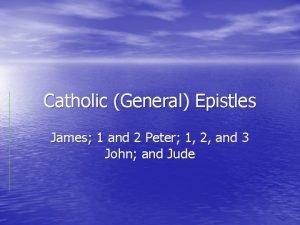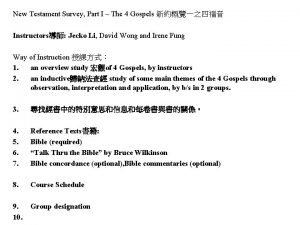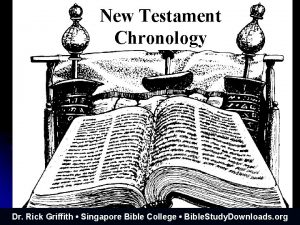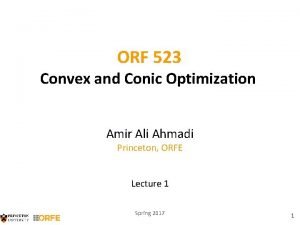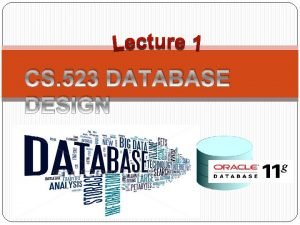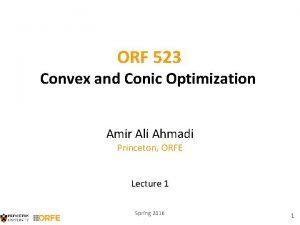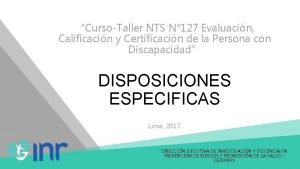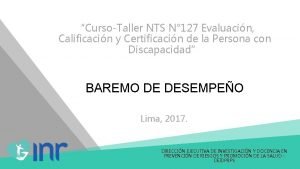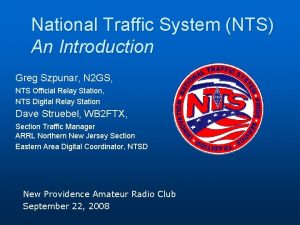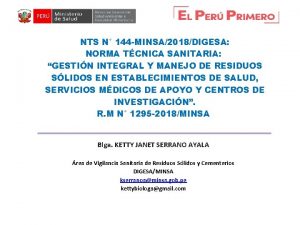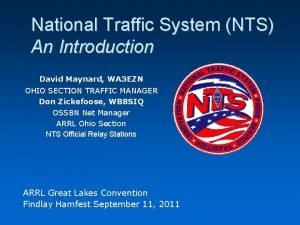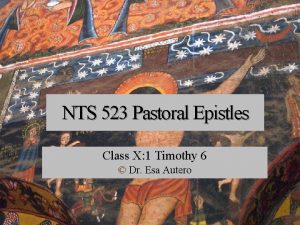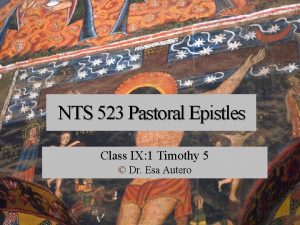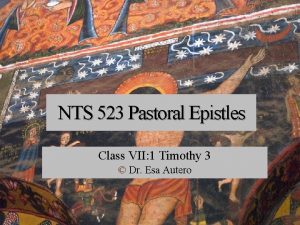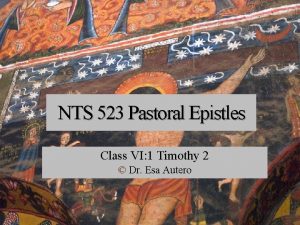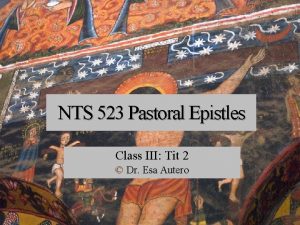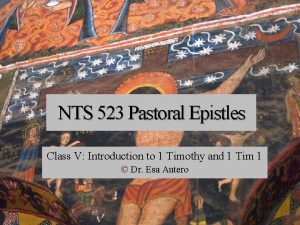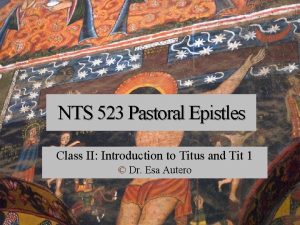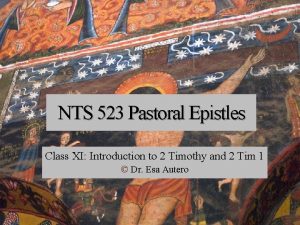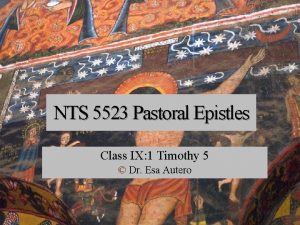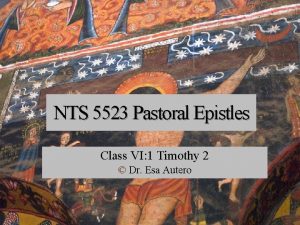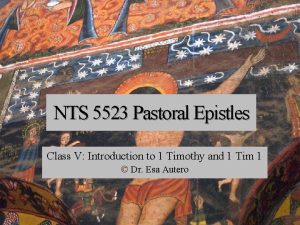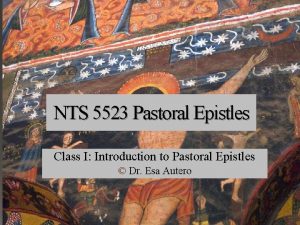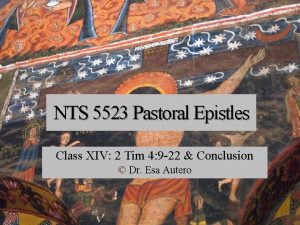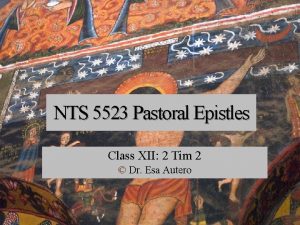NTS 523 Pastoral Epistles Class VIII 1 Timothy











![1 Tim 4 • “For this we labor (kopiomen) and strive [agonidzometha]” (4: 10) 1 Tim 4 • “For this we labor (kopiomen) and strive [agonidzometha]” (4: 10)](https://slidetodoc.com/presentation_image_h2/24b64c9a03380085352b610c1fc1ad19/image-12.jpg)


![1 Tim 4 • Gift (charismatos) given to you…[for instruction & encouragement] • Through 1 Tim 4 • Gift (charismatos) given to you…[for instruction & encouragement] • Through](https://slidetodoc.com/presentation_image_h2/24b64c9a03380085352b610c1fc1ad19/image-15.jpg)


![1 Tim 4 • ἔπεχε [hold onto; fix attention] σεαυτῷ καὶ τῇ διδασκαλίᾳ, ἐπίμενε 1 Tim 4 • ἔπεχε [hold onto; fix attention] σεαυτῷ καὶ τῇ διδασκαλίᾳ, ἐπίμενε](https://slidetodoc.com/presentation_image_h2/24b64c9a03380085352b610c1fc1ad19/image-18.jpg)

- Slides: 19

NTS 523 Pastoral Epistles Class VIII: 1 Timothy 4 © Dr. Esa Autero

1 Tim 4 9 It is a trustworthy statement deserving full acceptance. 10 For it is for this we labor and strive, because we have fixed our hope on the living God, who is the Savior of all men, especially of believers. (1 Tim 4: 9) πιστὸς ὁ λόγος καὶ πάσης ἀποδοχῆς ἄξιος· 10 εἰς τοῦτο γὰρ κοπιῶμεν καὶ ἀγωνιζόμεθα, ὅτι ἠλπίκαμεν ἐπὶ θεῷ ζῶντι, ὅς ἐστιν σωτὴρ πάντων ἀνθρώπων μάλιστα πιστῶν. (1 Tim. 4: 9 -10 BGT) 9

1 Tim 4 1. 1 Introduction to 1 Timothy 4 • Any specific topics that catch your attention in 1 Tim 4? • Any specific sections that have been used for • Doctrinal formulations? • Practical considerations in church or society? • Any questions/comments arising from the assigned readings?

1 Tim 4 1. 2 Structure and Rhetoric of 1 Timothy 4 • 4: 1 -16 – False Teaching & Spiritual Training • Nature of false teaching (4: 1 -5) • Spiritual Training (4: 6 -16) • Striving for the Gospel (4: 6 -10) • Exemplary behavior and endurance (4: 11 -16)

1 Tim 4 • Rhetorical purpose of 4: 1 -16 • Spirit, apostasy & the “Last days” • Why does Paul start to talk about “last times” in 4: 1? • Put into perspective the false teaching & apostasy • Not surprise given the “time” • God knew it & Spirit declared it Timothy needs to be ready for it (cf. Acts 20: 28 -32)

1 Tim 4 • 4: 6 -16 – personal instructions to Timothy • Timothy to be a model – Paul shows “how” (public & personal instruction per mandata principis) • Inclusio effect of the false teaching (1: 3 -4; 4: 1 -5; 6: 3 -10, 20 -21) • Basic issues in 4: 6 -16 • Timothy’s character quality • Timothy’s laborious ministry to the congregation Major emphases of the letter Connection to 3: 15 -16 (common confession) – 4: 1 error (But now…)

1 Tim 4 2. 1 Exposition of 1 Tim 4 • Spirit, apostasy, and Latter days (4: 1 -5) • Latter times (hysterois kairois) • Entire age b/w resurrection & 2 nd coming • Reality of the Spirit’s activity • pneuma rhetos legei – clear/explicit utterance • Through a word of prophecy • Content of Spirit’s utterance – warning about • apostesontai tines tes pisteos some fall away (1: 19 -20; 5: 14 -15; 6: 20 -21) • Active assent (prosechontes) to “deceiving spirits & teachings of demons” • Characterized by hypocritical lies [pseudologon] and seared conscience • Lies and seared conscience together w/ deception & demonic • Deliberate & self-inflicted state [kekausteriasmenon ten idian syneidesin]

1 Tim 4 • Content of the false teaching – • Forbidding/discouraging (koluonton) marriage (cf. 2: 15; 5: 14 -15; also 1 Cor 7) • Abstain/avoid certain foods Is this about Jewish asceticism (cf. 1: 7 -11) OR gnostic-type dualism (i. e. matter is evil; cf. 6: 20 -21) OR a mixture (cf. Col 2: 21; Gal 2: 12; Rom 14: 2 -3; 1 Cor 8: 7 -13) • Jewish-type asceticism of Qumran and Therapeutae in Egypt Paul counters with creation theology

1 Tim 4 • Creation theology to counter false teaching (4: 3 -4) • God’s creation is good (cf. Acts 10: 14, 28; 11: 18; Rom 14: 14) • Thankful reception (eis metalempsin meta eucharistian) • Marriage and food as God’s gifts to humanity • Believers possess the truth – enables to enjoy God’s created things • Sanctification [set apart] by prayer and word of God • Prayer – thanksgiving and acknowledgement of God as provider* • Word of God • the gospel and apostolic teaching of OT (2 Tim 2: 19; Tit 1: 3; 2: 5) OR • Specific OT section – e. g. Gen 1: 31 and/or 2: 15, 22 -25 The deception of falsehood in contrast to the truth & Timothy’s task

1 Tim 4 • Spiritual training & its outcome (4: 6 -16) • Timothy as a positive model • Contra false teachers who lead astray (cf. 4: 1 -5) • Words of faith (gospel), good teaching & trustworthy saying (4: 6, 9)* • Contra old wives’ tales (4: 7)** Best remedy for false teaching is the clear teaching of the gospel – w/ patience instruction & endurance • “These present…” – place truth b/f (hypotithemenos) or to believers • “being trained/nourished by the words” (entrephomenois tois logois) Importance of nourishing oneself & teaching others by sound doctrine

1 Tim 4 • “Train yourself to be godly” • Γύμναζε δὲ σεαυτὸν πρὸς εὐσέβειαν· (4: 7) Instead of preoccupying w/ tales • Train for true godliness – athletic metaphor* • Training in gymnasium for athletic competitions • Physical training has some value – but training in eusebeia has promise for this life and next (4: 8) (ἐπαγγελίαν ἔχουσα ζωῆς τῆς νῦν καὶ τῆς μελλούσης. ) From lesser to greater argument (Quintilian, Inst. 5. 10. 87 -92)** • This is a trustworthy saying (pistos ho logos) Reference to training in eusebeia and the accompanying promise or following teachings
![1 Tim 4 For this we labor kopiomen and strive agonidzometha 4 10 1 Tim 4 • “For this we labor (kopiomen) and strive [agonidzometha]” (4: 10)](https://slidetodoc.com/presentation_image_h2/24b64c9a03380085352b610c1fc1ad19/image-12.jpg)
1 Tim 4 • “For this we labor (kopiomen) and strive [agonidzometha]” (4: 10) • Image of intense labor/effort and athletic striving (cf. Col 1: 24) Part of ministry and calling (cf. 2 Cor 11: 22 -28) • Reason for labor is “hope in the living God” – future reward • “Savior of all people, especially those who believe” ὅς ἐστιν σωτὴρ πάντων ἀνθρώπων μάλιστα πιστῶν (4: 10) – reference to… • God will save everybody (universalism) OR • God “rescuing activity” of all people – not eternal salvation OR • God’s desire to save all people in general – but activated only for those who have faith (1: 16; 2: 4) – contra false teacher’s elitism (1: 4)

1 Tim 4 • “Command teach these things” (eusebeia, endurance etc. ) • Timothy’s “youthfulness” (neotetos) – not to be frowned upon • Gk. neos man up to 40 yrs. old (Polybius 18. 12. 5; Irenaeus, Haer. 2. 22. 5)* • Culturally younger supposed to obey older – even if they were wrong • Timothy young compared to Paul • Timothy to be an example in • Speech (logo) – no careless words • Conduct (anastrophe) – life in all aspects & interactions • Love (agape) – love for God and others • Faith (pistei) – faithfulness to God, ministry, and interest of others • Purity (hagneia) – upright character and conduct Above reproach and example in all areas

1 Tim 4 • “Pay attention to reading of Scripture, exhortation…” • Pay careful attention/heed (prosechete) to… • Public reading of Scripture (anagnosei; Acts 13: 15; 2 Cor 3: 14; Neh 8: 8; Philo, Hypth 7. 14) Only way to read/hear Scripture for most • Exhortation (paraklesei) – practical challenge, encouragement & instruction; to remain faithful • Teaching (didaskalia) – instruction on Scripture and content of the gospel & apostolic teaching • Not a sum total of worship service but teaching “until I come…” (4: 13) – Timothy’s temporary assignment (cf. 3: 14)
![1 Tim 4 Gift charismatos given to youfor instruction encouragement Through 1 Tim 4 • Gift (charismatos) given to you…[for instruction & encouragement] • Through](https://slidetodoc.com/presentation_image_h2/24b64c9a03380085352b610c1fc1ad19/image-15.jpg)
1 Tim 4 • Gift (charismatos) given to you…[for instruction & encouragement] • Through prophecy (dia propheteias) – prophetic word (cf. Acts 13: 1 -3) • With laying of hands of the group/council of elders (meta epitheseos…cheiron tou presbyteriou) • Presbyteriou – a group of elders/leaders (gerousia/presbyterion)* • Spiritual impartation that involved Sprit, leaders & community • Spirit guided prophetic utterance, elders’ prayer & recognition of Godgiven calling and gifts – pneumatic way of equipping & recognizing not formalized “ordination” for a “graduate” – more dynamic Timothy not elder or overseer – diakonos (4: 6**) & apostolic delegate

1 Tim 4 • Don’t neglect spiritual gift (me amelei…charismatos) spiritual gifts need to be used, maintained, and activated to function properly (cf. 1: 18; 2 Tim 1: 6 “fan to flame”) • Timothy’s dependence on God’s grace and the gift of the Spirit in ministry What is the relationship b/w 1: 18; 4: 14; 2 Tim 1: 6?

1 Tim 4 • Give careful thought/attention to these things (tauta melete) • “be [absorbed] in them” – positive “obsession” in the things of God & ministry for the sake of others • “That your progress [proskope] might be evident to all” – why? • Evidence and example of God’s grace in the exercise of gifts and maturity of Timothy For others to see & follow (cf. 2 Tim 2: 17; 3: 13)
![1 Tim 4 ἔπεχε hold onto fix attention σεαυτῷ καὶ τῇ διδασκαλίᾳ ἐπίμενε 1 Tim 4 • ἔπεχε [hold onto; fix attention] σεαυτῷ καὶ τῇ διδασκαλίᾳ, ἐπίμενε](https://slidetodoc.com/presentation_image_h2/24b64c9a03380085352b610c1fc1ad19/image-18.jpg)
1 Tim 4 • ἔπεχε [hold onto; fix attention] σεαυτῷ καὶ τῇ διδασκαλίᾳ, ἐπίμενε [linger; persevere; persist] αὐτοῖς· (4: 16) • Positive effort in holding onto & fixing attention to oneself & teaching • Careful attention leads to furthering of sanctification & salvation • τοῦτο γὰρ ποιῶν καὶ σεαυτὸν σώσεις καὶ τοὺς ἀκούοντάς σου (4: 16) • “…you’ll save yourself and those who are listening” Timothy as a means to bringing others to maturity in faith & salvation

1 Tim 4 • Questions and directions for application – 1 Tim 4 • As you think of your own spiritual formation and calling, which aspects in 4: 6 -16 you need to pay more attention and positively “obsess” more? • What is the relationship b/w the Spirit, calling, empowerment for ministry on one hand, and church leadership and congregation as a whole on the other hand? • What is the dynamic of those parts in 1 Tim 4 – what about in your own congregation?
 Test: the general epistles
Test: the general epistles Test: the general epistles new testament survey
Test: the general epistles new testament survey Daylight and champaign discovers not more
Daylight and champaign discovers not more Pauline epistles
Pauline epistles Chronology of pauline epistles
Chronology of pauline epistles Orf 523
Orf 523 Comp 523 unc
Comp 523 unc We are well able
We are well able Cs 523
Cs 523 Orf 523
Orf 523 My faith has found a resting place hymn
My faith has found a resting place hymn Marketing mix
Marketing mix 523
523 Nts sr
Nts sr Nts 127
Nts 127 Nts 127
Nts 127 Nts
Nts Nts cervello
Nts cervello Norma tecnica 144-minsa/2018/digesa
Norma tecnica 144-minsa/2018/digesa Nts radio frequency
Nts radio frequency
